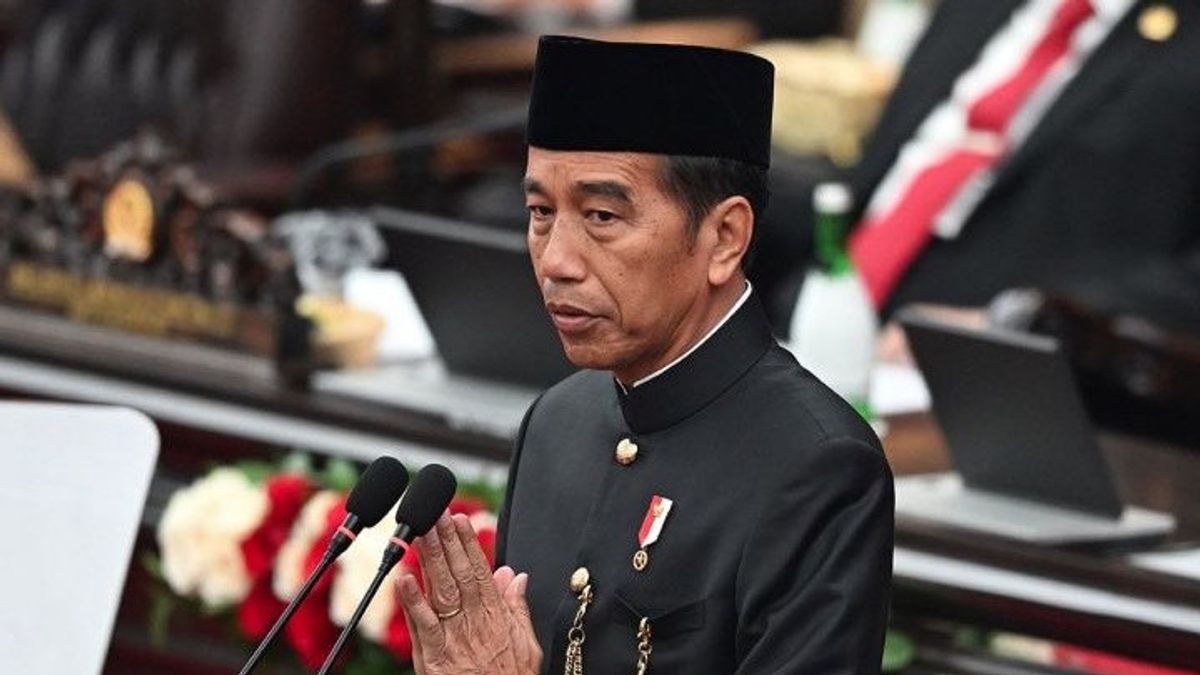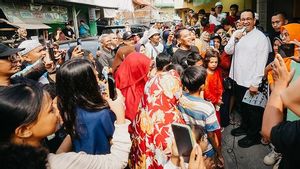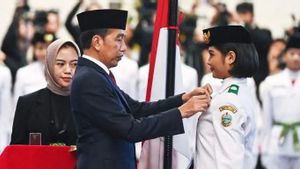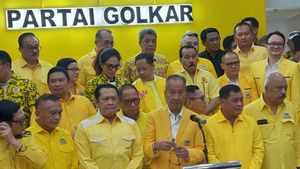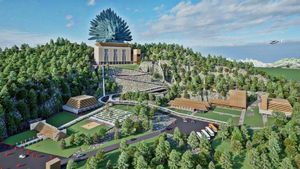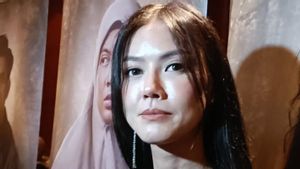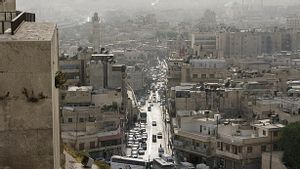JAKARTA President Joko Widodo (Jokowi) has repeatedly apologized to the public before the end of his leadership. gestur and micro expressions expert said Jokowi did not feel comfortable when apologizing to the public.
Jokowi only has about two months to serve as the number one person in Indonesia. After winning the 2014 election, the former Governor of DKI Jakarta will step down in October 2024.
When his leadership period ended soon, Jokowi repeatedly apologized to the public.
The original Solo man apologized for his leadership in the 79th Anniversary of the Indonesian Independence Day National Remembrance and Prayer event on the front page of the Merdeka Palace, Thursday (1/8/2024). This is Jokowi's first apology in August.
"On the first day of independence month, August, with all my sincerity and humility, allow Professor KH Ma'ruf Amin and I sincerely apologize for all my mistakes and mistakes so far," said Jokowi.
"Especially as long as we both carry out our mandate as President of the Republic of Indonesia and as Vice President of the Republic of Indonesia," he continued.
President Jokowi again apologized to the Indonesian people in his state speech at the MPR Annual Session, Friday (16/8). At the DPR/MPR Building in Jakarta, Jokowi said that during his 10 years of government was not a long enough time to unravel all the problems of the nation.
He is also aware that he grew up in all limitations, far from special words, so it is very possible that there is a gap in the steps he takes.
"I apologize for any heart that may be disappointed, for any hope that may not be realized, for any ideals that may not yet be reached," he said.
Jokowi's apology attracted public attention. Because previously, there had never been a similar statement made by the former Mayor of Solo.
Over the past year or so, Jokowi's leadership in Indonesia has indeed been in the spotlight. Starting from his relationship with PDIP which is heating up, to allegations of political problems that have been carried out in order to smooth out his ambition to perpetuate power through those closest to him.
The success of his eldest son, Gibran Rakabuming Raka, who was finally elected as vice president to accompany Prabowo Subianto could not be separated from controversy. Jokowi is considered to have interfered in giving Gibran a red carpet through the decision of the Constitutional Court (MK) which changed the age limit rules for presidential and vice presidential candidates.
Most recently, Jokowi's name was re-connected when Airlangga Hartarto decided to withdraw as the General Chair of the Golkar Party suddenly.
Regarding the apology made by Jokowi in his speech at the MPR Annual Session, gestur and micro-expression expert Monica Kumalasari said that Jokowi felt some emotions at that moment. According to him, feelings of discomfort dominate Jokowi's head and heart.
Monica said Jokowi's speech this time was different from previous years because it was too short. The duration of Jokowi's speech was also considered tandem with the speech of the Chairman of the Indonesian House of Representatives, Puan Maharani, and the Chairman of the Indonesian People's Consultative Assembly Bambang Soesatyo.
"In the context of communication, something accelerated is an indication of something uncomfortable," Monica said, citing Antara.
Another thing that Monica highlighted in Jokowi's state speech was that she did not find any emotional stress, because it was delivered in a flat tone of voice, unlike last year's emotional nuances.
SEE ALSO:
In his state speech, Jokowi revealed more about economic success and development. The word 'development' is even among the most spoken.
"For example, building village roads, airports, dams, toll roads, and so on. This has been said many times, so this is a message that wants to be built, the branding that wants to be built is, he is the father of development," said Monica.
In the same speech, Monica observed a change in the intonation when Jokowi advised the next president, Prabowo Subianto. Jokowi's intonation sounded a dive and became more assertive. According to Monica, this shows the intention for Prabowo to continue Jokowi's development mission.
In addition to the state speech, public attention is also focused on the traditional clothes worn by President Jokowi. At the MPR Annual Session, Jokowi delivered traditional Ujung Serong clothes from Betawi. Meanwhile, during the ceremony, Jokowi's flag-raising ceremony was wearing traditional Kustim clothes inspired by the Sultanate of Kartanegara ing Martadipura. Then at the closing ceremony, Jokowi was seen wearing traditional clothing typical of the Banjar Tribe, South Kalimantan, namely Baamar Galung Pancar Matahari.
When Jokowi appeared in traditional Betawi clothes before the Indonesian independence ceremony, the public considered this to be a message about the possibility of his youngest son, Kaesang Pangarep, running in the 2024 Jakarta Regional Head Election.
Because at the same time the banner with the words 'Kaesang 2024-2029' was scattered at a number of highway points in Jakarta.
Deputy II of the Presidential Chief of Staff (KSP) Abetnego Tarigan said the traditional Betawi clothing worn by the president this time had a meaning of gratitude to the City of Jakarta.
"The president interprets Betawi traditional clothing as a token of gratitude to the City of Jakarta, which has officially become the capital city since 1966," Abetnego said in an official statement from KSP.
However, according to Monica, Jokowi's appearance, wearing a traditional Ujung Selong shirt and equipped with a coat of batik cloth and accessories in a coat bag and black cap, is a message to show his position is higher. That's because these clothes are usually worn by the Betawi aristocrats.
"This may be perceived that at the end of his term of office, he prefers to present an impression as someone with a high or noble position," he concluded.
Whereas previously, Jokowi had worn traditional clothes from the general public or non-Nationalists at the same moment, one of which was the clothing of the Bedouin ordinary people, triggering a response to the simplicity of a president.
Another thing about Ridwan Kamil, who wore traditional Betawi clothes during the 79th Indonesian Independence Day at IKN Penajem Paser Utara, East Kalimantan. The man who is familiarly called Kang Emil firmly called the traditional clothes chosen as a form of his readiness to run in the Jakarta gubernatorial election.
The English, Chinese, Japanese, Arabic, and French versions are automatically generated by the AI. So there may still be inaccuracies in translating, please always see Indonesian as our main language. (system supported by DigitalSiber.id)
